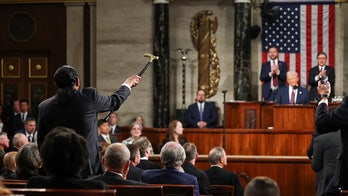Democrats undermine own calls for unity with impeachment push
Harvard Law School emeritus professor Alan Dershowitz sounds off on 'Hannity'
House Democrats have drafted an article of impeachment against President Trump accusing him of inciting an insurrection before protesters rioted at the Capitol building on Wednesday, but the timing of how the impeachment process will play out remains up in the air, raising the question: Can the Senate hold an impeachment trial for a president who is no longer in office?
With eight days remaining in Trump's presidency, House members such as Rep. Alexandria Ocasio-Cortez, D-N.Y., have called for a swift and immediate impeachment and removal, claiming that Trump is a danger to the country while he is still in office, while others have supported the idea of delaying the process for months so that President-elect Joe Biden can focus on his own agenda during his first 100 days in office before Congress is consumed with an impeachment trial.
While holding an impeachment trial for someone who is already gone from office may seem unproductive, it could strip Trump of post-presidency benefits and prohibit him from ever running again.
Still, it remains unclear as to whether such a trial can even legally take place. The Constitution does not directly address the issue, and constitutional law experts are split.
Constitutional law scholar and Harvard Law Professor Emeritus Alan Dershowitz says the answer is no.
"The Constitution specifically says the president shall be removed from office upon impeachment," Dershowitz told Fox News' "Sunday Morning Futures," noting that it does not say "the former president." Therefore, he argued, the Senate's "jurisdiction is limited to a sitting president," barring the possibility of a trial.
Dershowitz insisted that a Senate trial "will not happen" regardless of when the House votes to impeach Trump, claiming that Senate rules would prevent a trial from starting until 1 p.m. on Jan. 20, which would be one hour after Trump leaves office.
CALLS TO IMPEACH TRUMP GAIN MOMENTUM, REPUBLICANS ASK BIDEN TO INTERVENE
Fellow Harvard law professor Cass Sunstein agrees.
"I tend to believe it is only for current officeholders," Sunstein told NBC News.
On the same program, however, Sen. Marco Rubio, R-Fla., had a different take, stating that once the House votes to impeach, the Senate is required to hear the matter regardless of whether the president is still in office.
University of North Carolina Law Professor Michael Gerhardt had a similar stance, telling NBC News that the Senate can commence with a trial once the House has impeached, regardless of the timing.
"I don't see any constitutional problem with the Senate acting fast or slowly," Gerhardt said.
While scholars and officials may have differing opinions, the answer could possibly be found by looking to the 1876 impeachment of former Secretary of War William Belknap. The House was scheduled to vote on Belknap's impeachment for corruption on March 2, but Belknap handed in his resignation to President Ulysses Grant minutes before the vote was set to take place. The House ended up voting to impeach Belknap anyway later that same day.
CLICK HERE TO GET THE FOX NEWS APP
The following month, the Senate held a trial for Belknap after determining that they had jurisdiction over former officials. Belknap was ultimately acquitted after a majority – but not the required two-thirds – of the Senate voted against him.
The Belknap impeachment could end up being cited as precedent should the House try to force a delayed impeachment process. Still, Trump could very well challenge this and look to the courts for a definitive ruling on the issue.















































